#continuous development
Explore tagged Tumblr posts
Text
Are You Growing? Why Personal Development Never Really Ends
I used to think that once I hit a certain milestone, whether in my career, relationships, or personal goals, I’d feel a sense of completion—that I’d “made it.” But as time went on, I realized that reaching one goal just opened the door to another. Life isn’t about a single destination; it’s a series of evolving benchmarks, each one inviting us to stretch a bit further, dig a little deeper, and…
#continuous development#growth mindset#life goals#lifelong learning#never stop growing#personal development journey#personal growth#self-awareness#self-improvement#self-reflection
0 notes
Text
Once I was listening to a podcast and one of the hosts was like “the key to confidence isn’t never making mistakes and knowing everything, but making mistakes and being totally okay w the fact because everyone makes mistakes and it’s not a statement about your worth” and oh my god okay. My trauma bond w shame is dying a slow death.
#I feel like until my prefrontal cortex is developed I’ll just be prone to freaking out#So I’ll artificially stimulate whatever 30 something year old brains effuse naturally by meditating#And continuing the hunt for a therapist who is much older than me 🩷#My current therapist is cute I think I just need older ppl to dissect my ill diseased mind too
2K notes
·
View notes
Text
The Benefits of a Growth Mindset in the Workplace
A growth mindset is not just a personal development concept; it can also have a significant impact on the workplace. When employees adopt a growth mindset, they are more likely to embrace challenges, learn from failure, and seek out new opportunities for growth and development. This can lead to a range of benefits for both individuals and organizations. Here are some of the key ways that a growth…
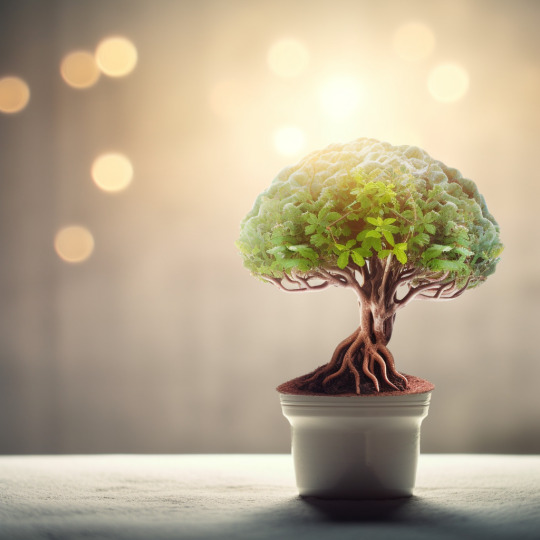
View On WordPress
#change management#Collaboration#continuous development#creativity#employee development#employee engagement#Feedback#Growth Mindset#innovation#leadership#Learning#organizational success#Personal Growth#positive work environment#Productivity#Professional Development#Resilience#teamwork#workplace
0 notes
Text
Kabru, impossible mutual understanding & unknowable objects
Despite his concerted and constant efforts to understand other people, it’s established in a few extras that Kabru believes that true mutual understanding between certain different races is impossible. Specifically, between long-lived and short-lived races, and between humans and demi-humans. Partially, we can trace this conviction back to specific hang-ups caused by his life; the trauma of the Utaya disaster, prejudices he carries from his childhood, and his experience of racism among the elves. In this “little” essay, I’m gonna discuss how I think those experiences formed this belief, how it comes out in his actions, and how some of his actions seem to contradict it. The question of whether it’s possible to reach mutual understanding with other living beings despite our differences is one of the core themes of the manga, and I’ll also touch on how this aspect of Kabru’s character links to that.
Seeking understanding
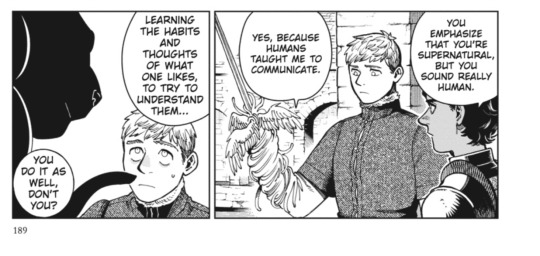
Kabru is a character who devotes a huge amount of time and effort to understanding people, and he is very good at it. In his internal monologue, we can tell how advanced and complex his skills of analysis are. He is able to read a huge amount of information just from looking at people's faces and body language.


People are, to him, what monsters are to Laios. This is something that's been expanded on at length in other, excellent meta. It's the fact that they're foils; it's the fact that Kabru is also very easy to read as autistic, with a special interest which is the opposite and parallel of Laios'. It's something that came out of trauma and alienation, as Laios' special interest in monsters also began as a coping mechanism.
The complicated origin of this "love" for monsters and for people comes through, I think, in the fact that one of the places we see both characters use their fixation is in being very, very good at killing the thing that they love. This also ties into the idea that loving something isn't even remotely mutually exclusive with using it to sustain your own survival; using it for your own purposes; hurting it or killing it. Love can be, and often is, violent, possessive and consumptive. This understanding is part of what makes Kui's depiction of interpersonal relationships so compelling to me.
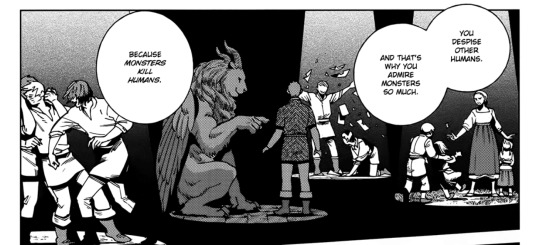
While Laios fixated on monsters and animals to seek a place of escape, in both his imagination and his self-image, from the humans who he couldn't understand and who couldn't understand him, Kabru seems to have fixated on understanding people in order to navigate the complex, socially marginal places that he has been forced into throughout his life. As an illegitimate child raised by a single mother with an appearance that marked him out as different to the point his father's family wanted to kill him, and a tallman child raised among elves who didn't treat him as fully human and wanted him to perform gratefulness for that treatment – treatment that, after he met Rin at age 9, he certainly always understood could be a lot worse – his ability to work out what people wanted from him, whether they were friendly or hostile or had ulterior motives, wasn’t just an interest. It will have been an essential skill.
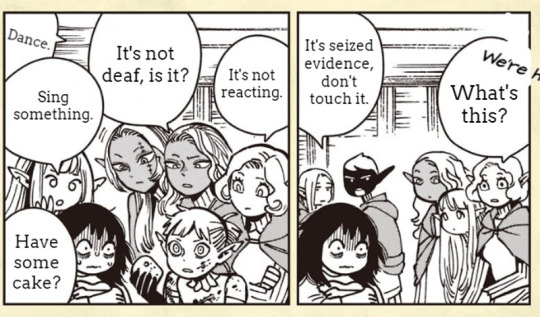
Milsiril, I think, was a flawed parent who tried to do her best by Kabru and did a lot of harm to him despite her best intentions. She may have treated him much better than an average elf would have, but like Otta and Marcille's mother, there are other elves with different outlooks on short-lived races. How would they judge her treatment of him? We don’t have any insight on what it could be, but to be honest, the person’s whose opinion of her I’d be most interested in knowing is Rin’s.
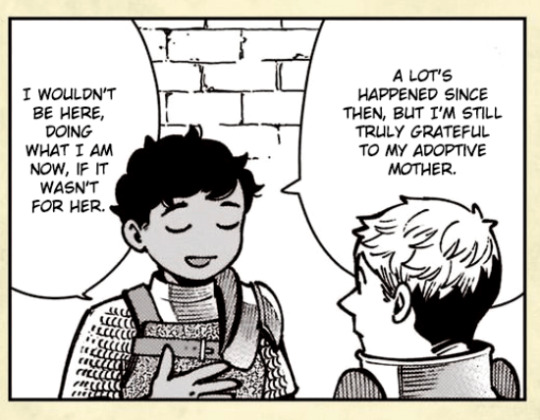
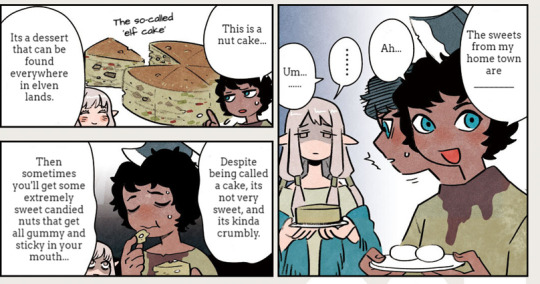
But even if she'd been perfect, living as an trans-racial adoptee in a deeply hierarchical nation with a queen who is a 'staunch traditionalist' who wouldn't even acknowledge the existence of a half-elf like Marcille (according to Cithis) is an experience that would deeply impact anyone.
Elves & Impossible mutual understanding
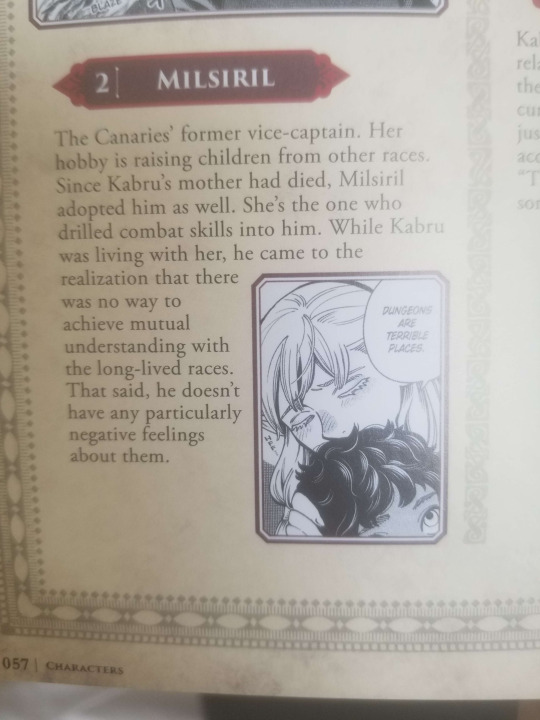
While Kabru was living with Milsiril - in other words, while living in the Northern Central Continent - he came to believe that "there was no way to achieve mutual understanding with the long-lived races."
This is evident in his political project: he wants short-lived races to have ownership over the dungeon's secrets. Despite his dislike of the Lord of the Island, he's a useful bulwark to stop the elves taking over. Despite his doubts about Laios, Laios needs to be the one to defeat the dungeon, because if he doesn't the elves will take over.
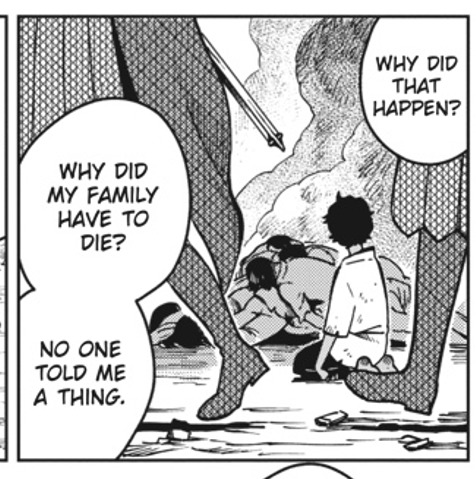
Kabru still carries a deep scar from Utaya, one that was exacerbated by the fact that he never got an answer to any of his questions about what happened or why. This, despite the fact that Milsiril knows about the demon and how it works. Do you think Kabru, with his social perceptiveness that borders on the superhuman, wasn't aware that she knew more than she would tell him?
Given that, the fact that he gets to a place where he "doesn't have any particularly negative feelings about [elves/long-lived species]" .... well, to put it bluntly, I believe that he thinks that's the case, but I kind of doubt it. After all, if he did have resentment, of Milsiril (someone who was his primary provider and caretaker since age six, and who despite her flaws, loves him and who I do think he loves) or of elves (who he has had to play nice with for most of his life, in order to survive, and will still have to play nice with in order to achieve his goals, since they hold all the power) what would that do except hurt him and make his life harder? Kabru is Mr. Pragmatic, so I don't think he'd let himself acknowledge any such feelings he did have. Exactly because he can't acknowledge them, they're well placed to get internalised as beliefs about the Fundamental Unchangeable Nature of the World.
However, these stated beliefs seem to contradict his actions. Despite his belief in the impossibility of forming a mutual understanding, he certainly seems to try to understand long-lived people, just as much as he does short-lived people. There's no noticeable difference between his treatment of Daya & Holm versus Mickbell & Rin that isn't clearly down to their relationship with him. His skills of human analysis were honed and developed while living amongst elves, and as soon as he's alone with Mithrun he immediately sets to understanding him - his interests, his motivations, his needs, and his past.
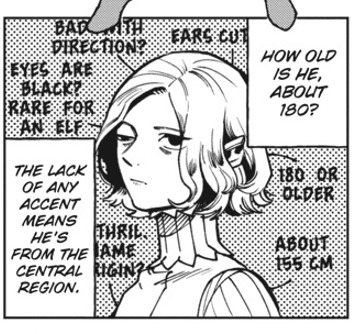
He treats him considerately and without bias, and despite the fact that Mithrun conquering the dungeon for the elves is both a reenactment of a core part of his childhood trauma and a political disaster for his aims, that doesn't seem to colour his perspective on Mithrun negatively at all.
This is something I find extremely laudable about Kabru, and it's another way he parallels Laios. He seems to understand that people, as a rule, (in Laios' case, he understands this about monsters - and eventually, all living beings) will act in their own interests, and if those interests conflict with yours, might harm you. But that's just their nature, and it's not something that should be held against them; you're also doing the same thing, after all. The crux of Laios' arc is precisely that he has to accept the responsibility of hurting someone else in order to achieve what he wants.
Kabru is deeply concerned with his own morals, what he should and shouldn't do, but mostly in the context of responsibility for the consequences - a responsibility he takes onto himself. He isn't scrupulous about what he needs to do in order to create the outcome he wants, but if he fails to create that outcome, then....
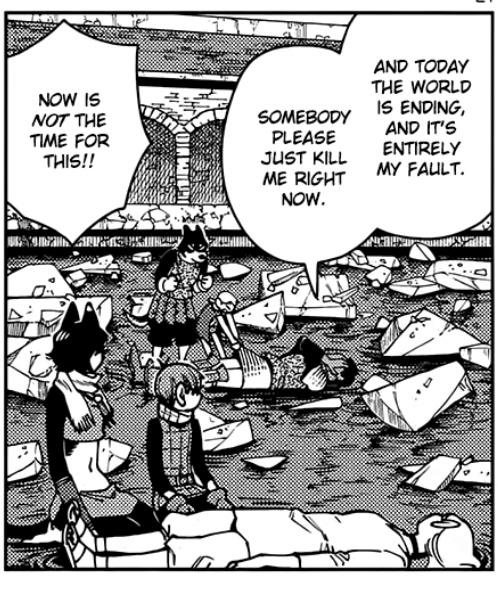
He blames himself to the point of thinking he should die. He doesn't blame Laios, or seem at all angry with him, despite concluding he should have killed him to prevent this outcome. That's because in his eyes, ultimately Laios was going to act according to his own nature, and it's Kabru's fault for not understanding that nature well enough. He's extremely confident in his ability to understand and predict others, (including elves and other long-lived people). Then, where does his conviction that mutual understanding is impossible come from?
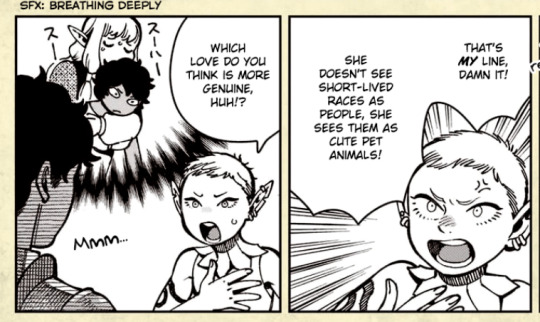
Partially, it's the "mutual" part. I'm sure Kabru, who isn't able or willing to deny Otta's insinuation that Milsiril saw him more like a pet than a son, has felt that his full interiority, the depth of his feelings and his ability to grow, act, and think as a fully equal being, was something that the elves around him just couldn't grasp. Because that was their excuse for it, he came to understand this as a gulf between short-lived and long-lived beings, an inevitable difference in outlook caused by their different lifespans.
This experience might be part of what leads to his iconic “fake” behaviour. He trusts his ability to understand others, but if they aren’t able to understand him, then there isn’t any benefit to being honest about his feelings and thoughts. If his attempts to reach mutual understanding with his caretakers were never able to be fulfilled, then it isn’t any wonder that he reacts with such surprise and horror at blurting out his desire to be Laios’ friend.
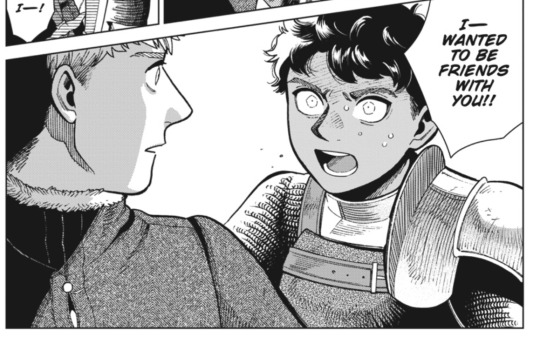
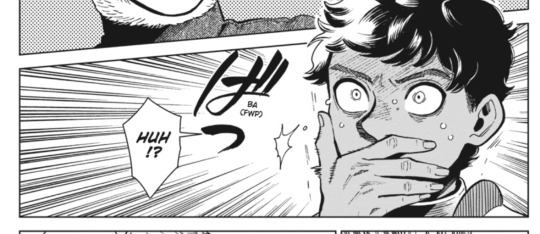
In his experience, making yourself vulnerable in that way only leads to being hurt. Soothing him, hushing him, lying to him, talking to him like a child that isn’t able to use proper judgement – that’s an inadequate and deeply hurtful way to respond to genuine distress, the desire for autonomy, or disagreement. Ultimately, I think that’s why he comes out on the side of being grateful to Milsiril; because she did equip him with the skills and knowledge he’d need to reach his goal, and let him go.
Though he could understand them, they couldn't understand him. To the extent that was true - which I'm sure it was - it wasn't due to anything about lifespan. It was due to the elves’ racism, and the solipsitic mindset & prejudiced attitude that it caused them to approach him with.
Because, if it needs to be said, the idea that there is an unbreachable gap in understanding between the long-lived and short-lived species is not true. Marcille and Laios have a much greater difference in lifespan than any full elf from any short-lived person, and they’re able to understand each other – maybe not perfectly, but better than many other people who are closer in life-span to them.
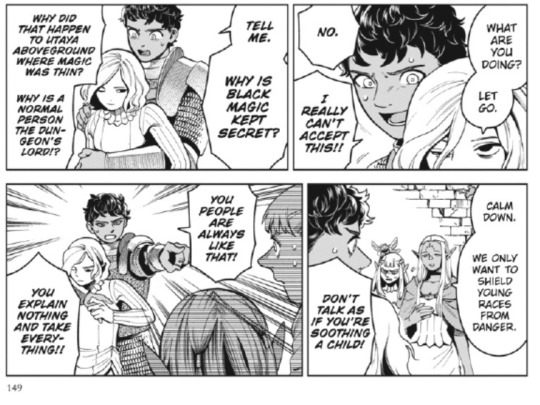
That doesn’t mean that I think Kabru is wrong about this, however. Because there’s an interpretation of his statement that is reflected in his actions and is true. When he talks about his problem with elves, it’s not just their attitudes: it’s their power, and what they use it to do. They “explain nothing and take everything”. Though it’s presented in the guise of ‘guiding and protecting’, in fact it’s a simple case of a powerful nation using their military power, wealth, access to resources, and historically stolen land – including the island itself – to protect their own interests and advance their own agenda. That’s why they’d be able to show up, seize the dungeon, and forcibly take Kabru’s party and Laios’ party to the West. If Kabru wants to stop that from happening, or change that status quo, persuasion or a bid to be understood would be completely pointless. Between the political blocs formed by long-lived species and the interests of short-lived species, “mutual understanding”, given their current, unequal terms, would be impossible. This is something that we see reflected in Kabru’s actions; before he asks his questions about the dungeon, he grabs Mithrun as leverage. He never really attempts to persuade the canaries to see his point of view, because that would be pointless: they’re agents of the Northern Central Continent’s monarchy, and will act in its interests regardless of any individual relationship with him.
I don’t think Kabru sees the different dimensions of this belief of his in quite such clear terms, however, as is evidenced by the other group who he thinks it’s impossible to communicate with.
Demi-Humans & Unknowable Objects
The other place that we see his conviction about the impossibility of mutual understanding is in the kobold extra.
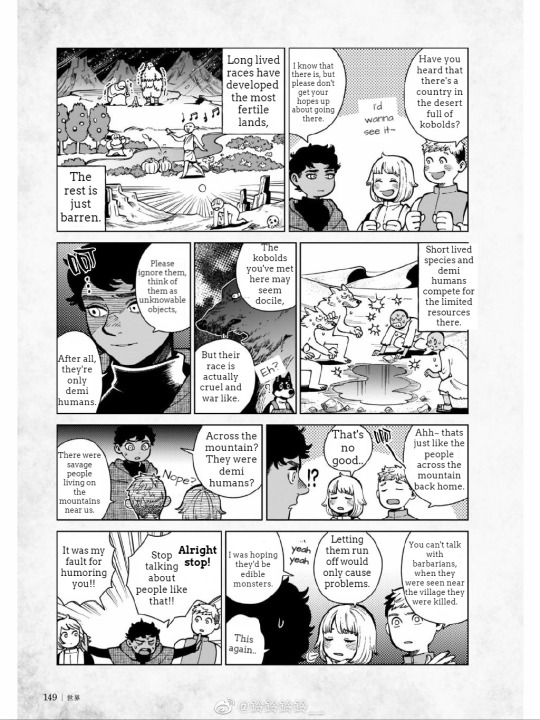
I'm including the whole thing, because I think it's an excellent and clever piece of world-building. Aside from what it says about Kabru, which I'll expand on shortly, what this extra does is deconstruct and call into question the usual "fantasy ontological biology" present in these sort of DnD-like settings. Essentially, the kind of worldbuilding where a race (such as kobolds) can be described as war-like, and that's establishing something essential about their biological nature. That's common to the point that if Kui didn't include this, some people would probably come away thinking that's the case about, e.g., the orcs.
But here, despite what Kabru is saying, the information the reader actually gets is:
the conflict between short-lived humans and demi-humans such as kobolds is mostly over access to material resources that they need to survive.
These resources are scarce because powerful nations, such as the elves, have monopolised them.
Kabru, who has grown up in a place at the centre of these conflicts, ascribes essential, negative traits to a cultural group which was in direct conflict with his own. Communication with this other group is impossible; they aren't people, they're more like objects.
oh yes! just like this conflict between groups of tall-men, a conflict which the reader will immediately interpret as more clearly analogous to real-life racism. Our other protagonists also carry prejudices from growing up in a place where a marginalised group was in conflict with the dominant group over scarce resources. It's definitely impossible to communicate with these people, and you can only kill them.
Woah, when you say it like that, it sounds pretty bad!
But also, nobody walks away having had a realisation or unlearned their prejudices - because they don't have the tools they need to do that work. Yet. I do think, to an extent, it could happen - especially with Kabru, since it's suggested in the epilogue that Melini might become a safe-haven for demi-humans.

To focus in on Kabru, the key here is his statement that you should think of demi-humans as "unknowable objects". Even his extraordinary powers of understanding have seemingly hit a limit. Part of this is just inherited prejudice, and doesn't need to have a complicated psychological explanation, any more than the elves who were prejudiced against him need one.
But also... this is probably somewhat linked to the way demi-humans seem to be considered "pseudo-monsters". They're the place that the strict delineation between the human and the monstrous is permeated. Laios, who is not interested in humans, remembers and is excited by Kuro. Chilchuck and Laios argue over whether it's OK to eat a mermaid. Kabru's prepared to (pretend to) roll with the idea that Laios ate the orcs.
But these are people, aren't they? Of course, this is a social construction, as we see from the fact that in the Eastern Archipelago, the label of "human" is reserved for tallmen, but in most of the rest of the world it depends on some obviously arbirary classification based on number of bones; "demi-humans" aren't in any essential way monstrous, except to an extent in their appearance, and physical location - due to their marginal social status, they're pushed out to live in unsafe places such as dungeons.
Therefore, Kabru's view of demi-humans as fundamentally "other", unable to be understood - monstrous - could be read as akin to abjection, the psychoanalytical concept described by Julia Kristeva. In order to create a bounded, secure superego, that thing which permeates and calls into question the border between self and other, human and animal, life and death, is rejected and pushed to the margin.
“Not me. Not that. But not nothing, either. A "something" that I do not recognize as a thing.[...] On the edge of nonexistence and hallucination, of a reality that, if I acknowledge it, annihilates me. There, abject and abjection are my safeguards. The primers of my culture.” (Kristeva et al., 1984, p. 11) “It is thus not lack of cleanliness or health that causes abjection but what disturbs identity, system, order. ” (Kristeva et al., 1984, p. 13) “The pure will be that which conforms to an established taxonomy; the impure, that which unsettles it, establishes intermixture and disorder. [...] the impure will be those that do not confine themselves to one element but point to admixture and confusion.” (Kristeva et al., 1984, p. 107) (discussing food prohibitions in Leviticus)
This is both (due to its affinity with food-loathing and disgust) a very fruitful concept to apply to dunmeshi, and a psychoanalytical theory which I wouldn't exactly cosign as True Facts About Human Psychological Development. You may also know the abject from its utilisation in the classic essay "Horror and the Monstrous-Feminine" by Barbara Creed - that's a lot more approachable than Kristeva if anyone's interested.
Key here, though, is that through the symbol of the "demi-human" is embodied a step between "human" and "monster" - and that's a prospect that puts at risk the whole notion of an absolute separation between those two categories in the first place. To Laios, that's something wonderful, and to Kabru, it's terrifying. We can see this principle further embodied in the relationship both characters have with the notion of becoming monstrous.
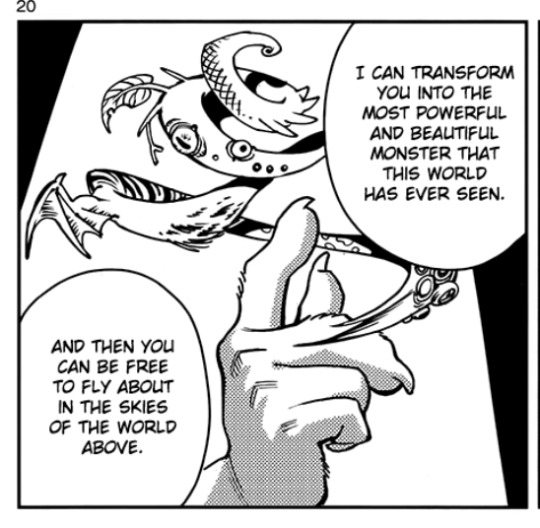
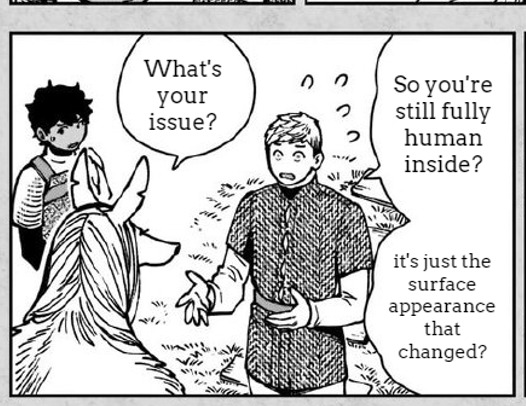
To Laios, this is transcendent, and represents a renunciation of everything human - in fact, if it didn't, it wouldn't "count".
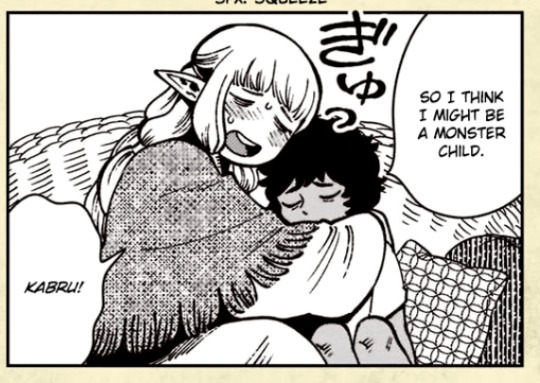
To Kabru, it's a deeply-held fear, established by his childhood alienation (due to his illegitimacy, his eyes, and perhaps also his neurodivergency), deepened by monster-related trauma and the sense of responsibility and survivors guilt he feels for what happened at Utaya. His identity as a human who is not monstrous is key to his sense of stability and safety; he doesn't want to touch monsters, he doesn't even want to see them.
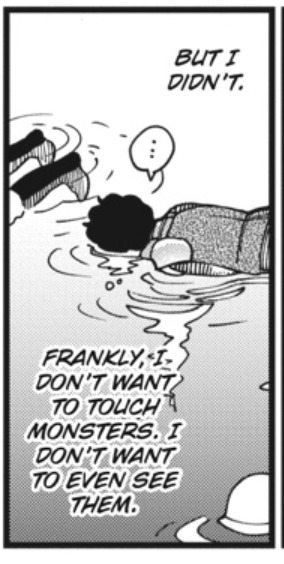
To acknowledge a kinship, a possibility of similarity between the things he loves (humans) and the things he hates (monsters) would be more than touching them - it would be putting them inside him. We know, quite explicitly, that this notion is triggering to Kabru. He literally has what seems to be a flashback when he's about to eat the harpy omelette.
So he abjects it, classifying the demi-human as fundamentally unlike him - an unknowable object, or an object that he refuses to know. Because in understanding it, he would interject the things he hates and fears into his self, which is already, always under threat by that hated and feared object.
Of course, again, Kabru isn't very good at enacting this refusal in practice. For one, when he chooses between his desires and ingesting the feared object, eating monsters... he eats monsters. Part of this is treating himself badly, the "ends justify the means" mentality. His goal is to destroy all monsters, so if he needs to become monster-like to do that, he will. But part of it is also the other motivation that he didn't even seem to know about until he said it: he wants to become Laios' friend, and to learn from him how a person can like monsters. He wants, at least in some part of him, to reconcile the feared and hated object into something he can understand.
For another:
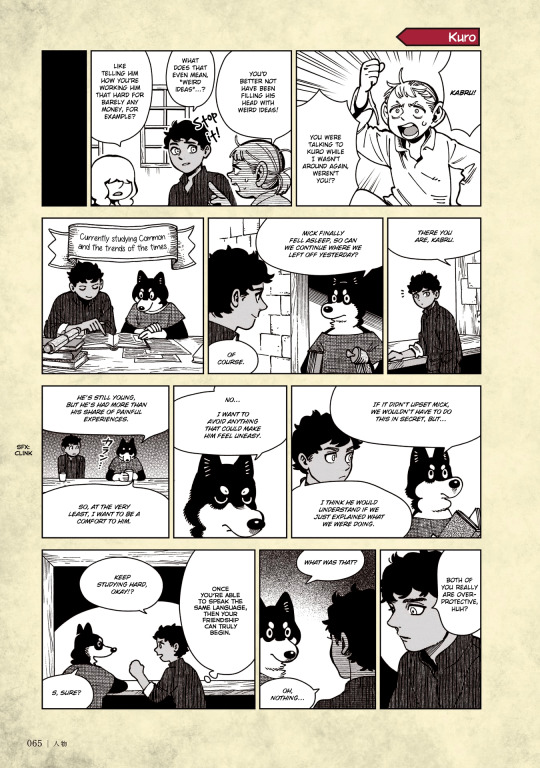
Kabru can speak the kobold language. In the first place, while this may have been common in Utaya, it also could have been something he chose to learn, an early expression of his interest in understanding and talking to all sorts of people. It isn't the kind of thing you learn if you believe that communication between yourself and the group that speak it is impossible, is it?
It's possible to harbour prejudices against a group while being kind to an individual, and given Kabru has those prejudices regardless of his reasons, that is what he is doing. But also, his treatment of Kuro doesn't reflect a sincerely held belief that he's an "unknowable object" at all. His approach is exactly the same as it is to any other person: an analysis of goal and motive, and an attempt to help if he's sympathetic and their goals align - going out of his way to give language and local knowledge lessons in secret. His conviction that Mickbell and Kuro will truly become friends when they can properly communicate is completely contradictory to any sense of demi-humans as fundamentally different, or impossible to reach mutual understanding with. To me, it seems like this self-protective shield against the corruptive force demi-humans as an idea present to his identity, this abjection, when Kabru is face-to-face with one, just simply can't hold up against his finely honed skill of intellectual empathy. Perhaps because he's autistic, it seems his "empathy" is less an emotional mirror response, and more a set of cognitive skills for analysis of others. That instinctual, emotional empathy might not trigger when presented with a member of an out-group, but if it’s possible for Kabru to turn his cognitive empathy off, we don’t see him do it.
This isn't to say that this prejudice doesn't affect his behaviour. For one, it could negatively impact his judgement of politics and policy, where individual people don't enter into it. For another, I'm not convinced he'd be willing to overlook Mickbell's exploitative relationship with Kuro if Kuro wasn't a kobold. As it is, since both of them are satisfied, he doesn't feel like he needs to intervene, regardless of the fact Mickbell isn't paying Kuro. But if Daya and Holm were in a relationship, and Holm took both Daya's and his own share from their ventures, but only compensated her in living expenses and kept the rest, do you think he'd tolerate it, for example? Even if she said it was OK?
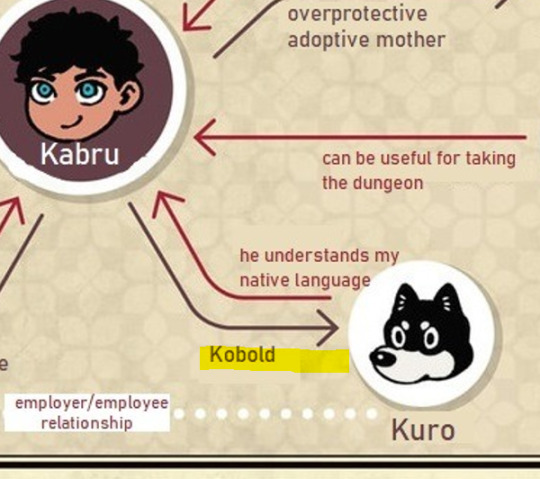
Conclusion

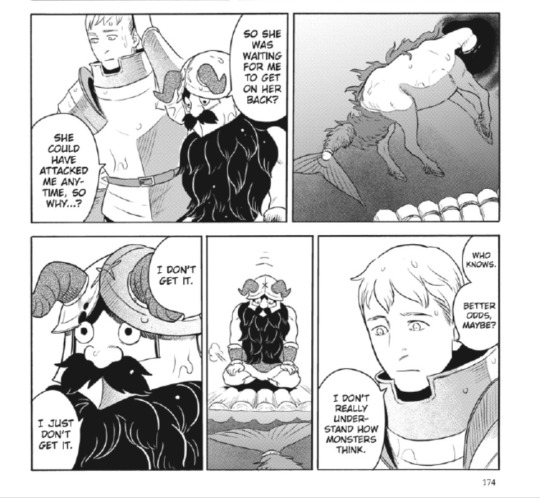
The kelpie chapter establishes that "people can never know what monsters are really thinking." That isn't just true of monsters, though.
True mutual understanding is impossible - between anyone. We can never truly understand another person's heart. This is touched on in, for example, the existence of shapeshifters and dopplegangers. Even a monster that seemed like a perfect copy of a person wouldn’t be that person, and wouldn’t be a satisfactory replacement.
We’re intended, I think, to understand the winged lion's repeated suggestions to just replace people who have been lost with copies as something uncanny, which demonstrates the way that the winged lion never manages to attain a complete understanding of humans. A version of a person who was created to fulfil your memories of them, to be the person who you wanted them to be, would be a terrible, miserable thing.
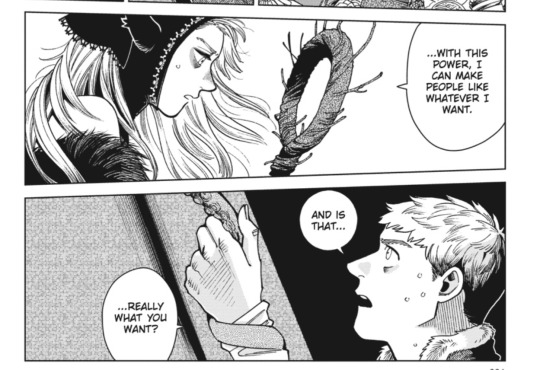
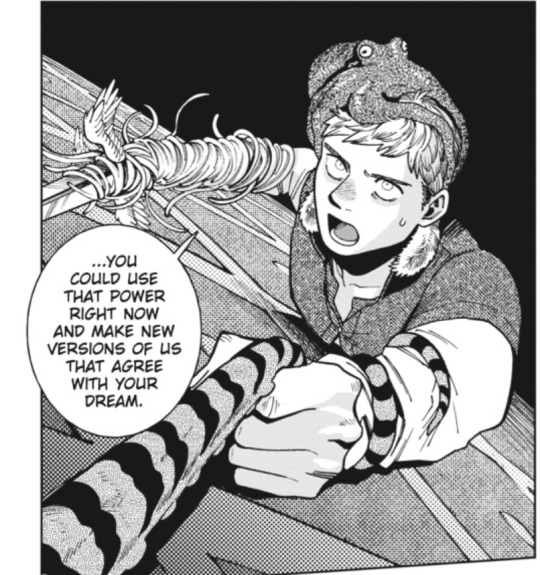

Disagreeing, coming into conflict, and misunderstanding each other, are essential parts of what it means to be living beings, as fundamental as the need to eat.
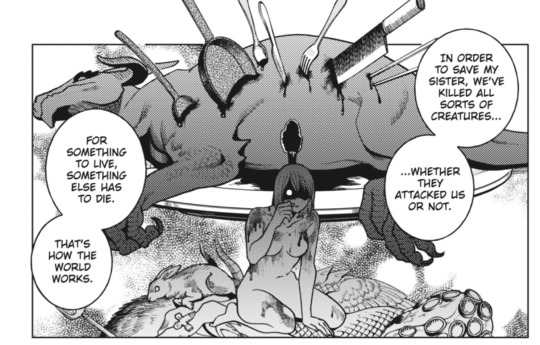
The only thing to do is not to take more than you need to eat to survive, and not impose your own desires onto others. To do your best to sincerely communicate your desires, even if they're embarrassing or vulnerable or strange, like Kabru eventually does with Laios; like Laios does, bit by bit, with the people around him; like Marcille does, Chilchuck does, Senshi does... to hope they will accept you, and do your best to understand them in return.
We can re-examine, in that context, Kabru's line about the elves' tendency to "explain nothing and take everything".
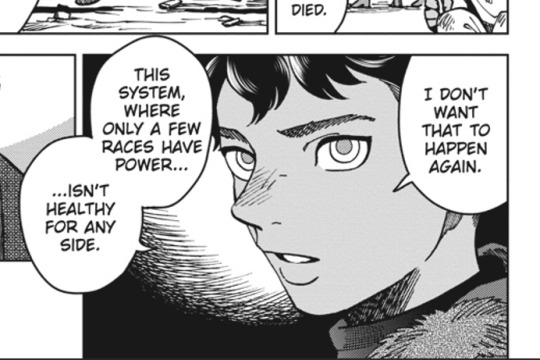
They have the power to impose their preferred "menu" onto less powerful groups. And in that context, mutual understanding being impossible just means that they won't give up their power because they're asked nicely. Kabru's goal is to seize the truth that they won't give to him, and to create a situation where they can't take everything. Because he's accurately surmised that nothing about the treatment of short-lived races will change so long as the power imbalance remains. Despite the way he mistakenly ascribes part of that to "long-lived vs short-lived" or "human vs demi-human", the actual gulfs in understanding he identifies are structural, are about power and about access to material resources and safety.
I think he could come to recognise this. Yaad is teaching him political science after all, and while a prince's lessons on political science won't exactly get at much that's radical or invested in the interests and perspectives of the marginalised (Capital is a critique of for a reason after all...) I believe in Kabru's ability to learn critically and get more from a lesson than it was intended to teach.
#og post#kabru of utaya#kabru dungeon meshi#laios touden#dungeon meshi meta#dungeon meshi#dunmeshi#dungeon meshi manga spoilers#dungeon meshi analysis#kuro dungeon meshi#the canaries#milsiril#continuing to develop my kabru theses.#literally sitting and thinking about kabru all day. rotating him.#he's in the microwave. to me.
2K notes
·
View notes
Text
Implementing Continuous Integration and Delivery with DevOps

At CloudZenix, we specialize in helping organizations implement a robust DevOps strategy that incorporates Continuous Integration and Continuous Delivery (CI/CD) practices. Our team of experts can work with you to design and implement a customized CI/CD pipeline that suits your organization's needs and goals. We can help you streamline your software delivery process, increase collaboration and communication between teams, and reduce the risk of errors and downtime. With our help, you can achieve faster time-to-market, improved quality of software releases, and increased customer satisfaction. Contact us today to learn more about our services and how we can help your organization achieve success with DevOps.
#continuous integration#continuous delivery#continuous development#devops solutions and services#devops service provider#DevOps
0 notes
Text
You’re a Gotham teenager playing FMK on your neighbor’s stoop as you do.
“Hmmmm… and marry Red Hood.”
“Red Hood?” says one of your friends. “Doesn’t he kill people?!”
You consider.
“That’s not a deal breaker for me.”
And then, from somewhere above, a distinctive mechanical voice:
“IT FUCKING SHOULD BE!”
You look up. Red Hood is dangling a spitting and hissy Robin over the edge with one hand and gesturing helplessly at you with the other. You stare at him. He stares at you. You don’t know how his face emotes “baffled but concerned for you horror” seeing as it’s covered completely by an expressionless helmet, but it does.
Robin chomps down on Red Hoods fingers.
“FUCKING FUCK!” Red Hood drops Robin over the edge. “DID YOU BITE ME?!”
Robin lands one roof over like a feral cat. He stands up with just as much offended dignity. “I was trained to make use of every tactical advantage,” he states.
Then he waves something small and indistinct from your distance. “Unlike you.” And swings off the roof.
Red Hood roars and chases after him.
There is a moment of distinctly Gotham silence.
“You made the right choice.”
You jump a foot and find Red Robin perched on the railing like some kind of overgrown parrot.
“Hood’s the only one of us who can cook,” explains Red Robin.
He gives you a single nod—and disappears.
…
Just another day in Gotham.
#batfam#only in gotham#at this point most gothamites believe throwing/dropping/flinging Robins is vital for their development#*yeets a robin* it’s enrichment#this rumor was started by a baby dick grayson who wanted to be flung off ALL the things#and continues strong with Damien and his many big brothers
5K notes
·
View notes
Text
i've seen lots of posts calling the bucktommy dinner a date - and was it a date? or was it two people in a relationship sitting down for dinner after a long day? the fact that buck didn't change his shirt (and that their food looked leftover night) makes me think the latter. which i love, because it speaks to where their relationship is - buck's been spending nights over at tommy's, tommy comes over to his to eat and spend time with him. and he looks comfortable in buck's space. neither of them felt like they were trying to impress the other; they were relaxing in their boyfriend's company.
#evan buckley#tommy kinard#bucktommy#911 abc#part of me hopes we get a timeskip so we can see them even more settled in#another part doesn't so we can continue to see them develop the relationship#the loft dinner did a TON in one minute but i'm selfish and want way more#smoke.txt
409 notes
·
View notes
Text

catching up,,, finished s3 👁️
#my art#artists on tumblr#sketches#the magnus archives#tma#jonathan sims#sketching jonathan to escape art block and it's working 😌#continuing to develop the brainrot even further#the eye came to my dreams last night#to all the people who left lovely tags in my previous post:#👁️ l see you and l love you
976 notes
·
View notes
Text
Barbatos outside of the main story: I have only ever let Diavolo even remotely close to me, and he's the most important person in my life who I am completely devoted to... but I love MC and they are becoming an equal and comparable presence in my life. I want to show the sides of myself I keep hidden from anyone else to them, and for them to feel comfortable enough to do the same in return.
The fandom for some reason:

#it's almost like....... he's not being honest and that's the point..... yes the devs are painfully underwriting it but still#just because solmare thinks its perfectly fine and normal to mostly ignore his storyline for 4+ seasons#instead of continuing to develop it for more than two seconds every season#does NOT negate the fact that he and mc act like they've been married for 15 years everywhere besides the main story#obey me#obey me shall we date#obey me barbatos#barbatos#obey me nightbringer
288 notes
·
View notes
Text
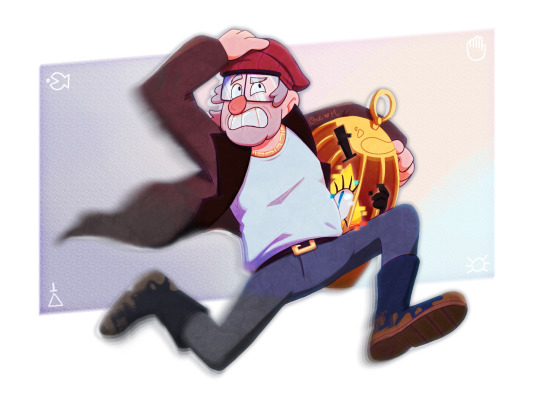

introducing my Gravity Falls AU i've been working on since August of this year: "Codename: Caged Canary"! 🐤⚠️
(or at least, still working on - i've been busy everywhere else though GDJDB)
AU Synopsis:
"During one of the sea trips, Stanley Pines got a vision / message from The Axolotl about Bill - that he'll be stuck in Stan's Mindscape watching through Stan's eyes and ears for the time being (thankfully powerless) as part of his "Exposure Therapy". As a fair trade, They also decided to transfer Bill's powers onto him for extra protection - although Stan didn't get them until later, which was quite a surprise for everyone involved.
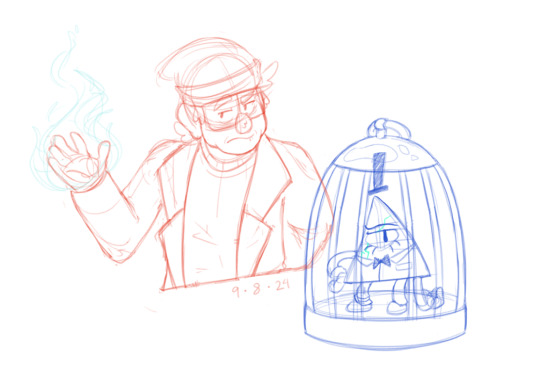
Does Stan know why he's being the test dummy for this whole Exposure Therapy™️ shtick? Does Bill know why The Axolotl suddenly decided to torture him more? Even so, does Ford know why would all of this happen to the three of them now?
The answer to all three: Nope. No direct answer can ever be given by the pink-frilled god, sadly... at least, not yet."
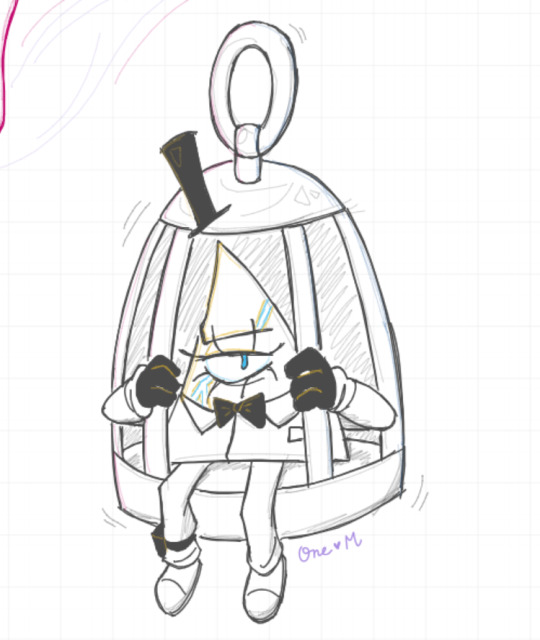
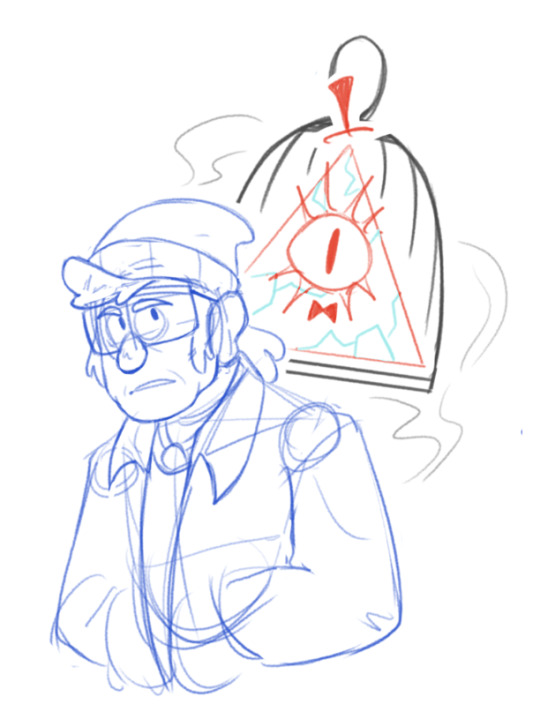
#gravity falls#gravity falls au#codename caged canary au#bill cipher#stanley pines#ford pines#the axolotl#my art#onem talks#wowee zowee would you look at that#i finally made an AU kinda /lhj HDKDH#i even added some exclusive sketches here hehe 👀#however i might as well tell ya'll that there's a 50-50 chance i'd continue to work on this AU -#considering my other recent fixation + my energy in trying to keep up with fandoms/socials and what not hhfd#feel free to ask me questions about this AU if you'd like tho!#maybe then i can further develop this silly thing without feeling indecisive again aaaa /nf /lh
339 notes
·
View notes
Text

fond of marcille (id in alt)
#dungeon meshi#marcille donato#i love her so much… FRANKLY i knew i would like her but i didn’t think she’d be my favorite and Yet…#she has thoroughly enraptured me with how much she fails and yet continues to try and try again#her character also surprised me sooo much while i was reading dunmeshi… there’s a natural feel to how characters both develop and can#regress in dunmeshi - that push and pull made every chapter feel unexpected and enjoyable to experience… esp true with marcie’s chara imo#ruporas art
961 notes
·
View notes
Text
Reshaping Data Centres and the Digital Landscape | AI News
New Post has been published on https://thedigitalinsider.com/reshaping-data-centres-and-the-digital-landscape-ai-news/
Reshaping Data Centres and the Digital Landscape | AI News
.pp-multiple-authors-boxes-wrapper display:none; img width:100%;
Artificial intelligence is changing the world and is projected to have a global market value of $2-4 trillion USD by 2030.
The future is now, and it feels as though we’re witnessing a big bang in technology every couple of months.
AI has crept into every facet of our lives, fundamentally transforming our work and play. Data centres are at the heart of all this excitement. Put simply, AI is when computer systems are used to simulate human intelligence processes. This includes learning, reasoning, and – particularly interestingly – self-correction. In other words, it’s like having a human brain in a computer. Bill Gates has compared its rise to the start of some of the most important technological advances in history.
The surge of AI is staggering. For instance, ChatGPT reached a million users in just five days; for Netflix, this milestone took a few years. The enthusiasm to implement the technology is evident from these instances of explosive growth.
However, AI has a surprisingly large appetite for data, and the computational power required to process that data is enormous, especially considering that it’s only set to increase further. That’s where data centre infrastructure comes in. Data centres are the backbones of the digital world and are no longer simply storage spaces but are rapidly evolving into entire ecosystems. These ecosystems are energy-hungry, requiring rapid processing power for energy-intensive processes and efficient delivery of data worldwide.
Data centres are home to rows of servers, storage systems, and complex networks that facilitate the flow of information. Such facilities are essential to various workloads, from search queries to financial transactions and digital interactions, and usually remain silent while completing their tasks. As progressive as AI’s demands and capabilities are, it is crucial to ensure their compatibility with data centre infrastructure.
Every computation involved in processing data is key to AI, and the efficiency of these processes depends on three primary types of processors: the Graphics Processing Unit (GPU), the Central Processing Unit (CPU), and the Tensor Processing Unit (TPU).
On the one hand, the GPU is great at managing parallelism, making it excellent for training AI models. On the other hand, the CPU allows for more flexibility in terms of simultaneous tasks on an increasing scale. Finally, the TPU, which is Google’s development in this sphere, is best suited for completing the highest possible number of AI tasks in the shortest amount of time.
Integrating AI into data centres presents several challenges:
Power: AI training processes require high-performance computing infrastructure, necessitating reliable and sufficient power supply systems.
Connectivity: Seamless, high-speed, and low-latency network connectivity is crucial for efficient data transfer and communication.
Cooling: AI workloads generate significant heat, requiring advanced cooling systems to maintain optimal operating temperatures.
AI is ever-emerging and ever-evolving, and thus, changes must be made to regulation. For example, the AI Act recently released by the EU categorizes applications of AI into four different levels of risk: unacceptable, high, limited, and minimal or no risk. At the same time, the NIS2 Directive has expanded cybersecurity regulation to cover the digital realm as well.
As such, one of the main challenges facing industries, including data centres, will be keeping up to date with these regulations. AI is progressing faster and further than anything we have seen in recent years, and data centres must move as quickly to keep up with the changing parameters and risk boundaries that are now being defined.
To sum up, the AI revolution is changing the way our digital infrastructure works, with the data centre being one of the first to be transformed. This transformation is crucial because, as we discover new ways of applying AI, we will need everything from technological advancements to regulatory compliance. This concerns both technological progress and the need to deal with new laws and regulations that pile up with the growth of AI. Thus, the history of AI and the data centre is one of continuous development and mutual shaping of each other.
Interested in learning more?
Data Centres Expo Europe | Data Centres Event & Conference
Register for free to attend the upcoming Data Centres Expo event and conference which will shine a spotlight on the future outlook for the sector, as demand for data centre spaces increase. Gain valuable insights from industry leaders and network with experts from the largest data centre providers. Examine key topics such as building AI ready data centre infrastructures, building scalability and sustainability into data centres, and cultivating the right data centre hardware solutions. Learn more and register for free here.
#ai#ai act#AI models#ai news#ai training#amp#applications#artificial#Artificial Intelligence#background#big bang#Brain#Building#chatGPT#Cloud#cloud computing#communication#compliance#computation#computer#computing#conference#connectivity#content#continuous#continuous development#cooling#cpu#cybersecurity#data
0 notes
Text
people who are like "oh no they ruined Caitlyn she is on the bad side now" am I the only one glad that Caitlyn's character took this turn? She was the face of the enforcers to the viewers for such a long time. She was kind, compassionate and diligent, the perfect "good cop".
But that's not a fair representation of the enforcers now, is it.
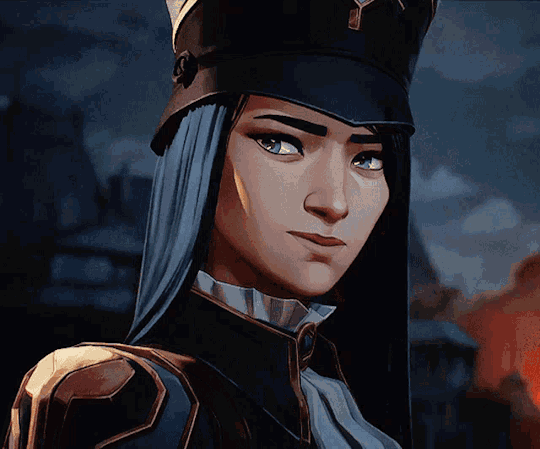
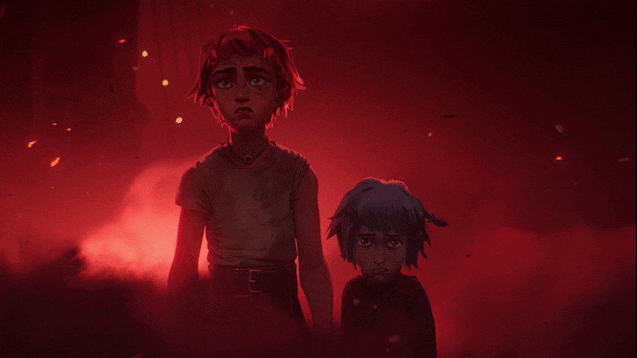
Vi and Powder were orphaned by enforcers. Kind? No.
When in order to survive, they snuck into Piltover to steal goods to sell them, it was enforcers's job to catch and punish these kids, no questions about what kinda life drove these children to do that asked. Compassionate? No.
When Vi got kidnapped arrested. She was put in prison for 6+ years, I doubt there was ever a due court process to determine whether this child was really guilty and deserved imprisonment or not. Diligent? No.
#when vi's mom was killed the system did not seek to provide justice for her.#when kirramman a woman of wealth and power is killed a war is started.#i thought it was very tone deaf of cait to invote vi to join the enforcers but it was actually a sign.#her further development into an authoritarian military leader is quite organic if you consider that.#thank you arcane for proving that good cops existing within the system are still part of that system. good people don't continue to be cops#p.s.#like yeah yeah i know that caitvi is canon and that both of them being enforcers is still canon too.#but to me it shouldn't be. not with the context we have now. so much of this feels like arcane writers just having to worm themselves aroun#a decade old poorly throughout narrative about a crazy terrorist bitch and her policewoman sister who wants to put her behind the bars#without blatantly promoting copaganda and without angering the average viewer#arcane#arcane spoilers
153 notes
·
View notes
Text




#Jace continues to develop the subject and someone's getting caught#my incorrect hotd#jacerys velaryon#aegon ii targaryen#aegon x jacaerys#jacegon#house of the dragon#hotd
205 notes
·
View notes
Text
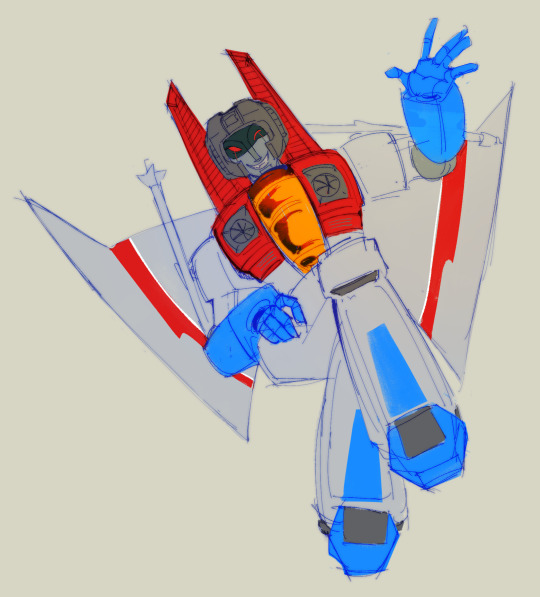
Chat I locked in .
#and then I don’t do detailed pieces FUCK OFF#you will NOT see me sitting down 10pm onwards staring at my screen rendering metal. no#all you get is doodles and sketches and simple stuff because ☺️#dude I’m going crazy I love him so much. I need him dead. I need him carnally. I need his gender. I need to punch him. I need him to get#ONE. singular happy ending.#at least. bare minimum ONE continuity where he’s happy and he’s getting redemption and he’s getting better#AND HE DOES NOTTT JUST WIPE ALL DEVELOPMENT OR DIE OR GET IMPRISONED#it’s so over#I ordered a tfone figure GUESS WJO 😭😭😭#anyways#transformers#starscream#checkadii
137 notes
·
View notes
Text
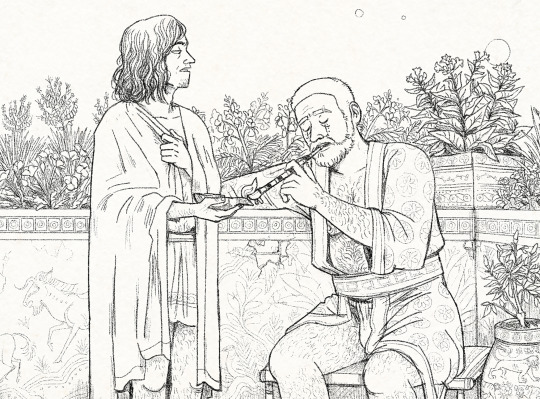
This was going to be a panel of a little comic but I got too invested in drawing minute background details so, here.
#They are having an argument over 1) whether crops can be grown on the moons 2) what - if any - impact does this have on the feasibility#of an afterlife being located on the moons#Brakul is a partial convert to the Imperial Wardi faith but this mostly entails having adopted the seven faced God (and some#other elements of the belief system) into his worldview and participating in expected rites while retaining his central#ancestor veneration practices completely unchanged and mostly prioritized.#This doesn't actually cause much friction in of itself with the big exception being disagreements on the afterlife#Wardi practices surrounding death prioritize proper handling of the corpse and funerary rites in order to get the dead where they#need to be- death is a fraught transition from one state to another. analogous to birth. The role of the living is to get the dead through#this transition (preventing them from being stuck earthbound as earthbound ghosts - which is the Bad afterlife). Once the dead#make it to the moons that's it. They don't really interact with the living. There's plenty of conceptualization of what it's Like#in the lunar lands but the cultural priority is not even slightly on the Logistics of existence there.#Whereas the CORE of religious practice among the Hill Tribes is ancestor veneration - ancestors remain interactive with the living#and require/desire their continual support. They are conceptualized as having earthlike 'lives' where they eat and drink#and grow crops and herd livestock and they need the support of the living (in prayers and offerings) to do so prosperously.#There is a HIGH cultural priority on the logistics of their afterlife and it's self-apparent that the world of the dead needs fertile earth#to support them.#So like bottom line Brakul thinks there's no goddamn way that the moons could support an afterlife (they are described as#barren rock that was flung into the sky during creation and certainly Look that way)#and that the Wardi are just wrong about their afterlife's location. They probably go to the celestial fields (which are located#behind the moons and stars) like everyone else#And Janeys finds this aggravating and doesn't see his fucking point but has developed a nagging concern that Brakul Could be#partly right in that the celestial fields could Maybe exist in addition to the lunar lands.#So like maybe they aren't going to go to the same place when they die?#He's already terrified that he'll be stuck as an earthbound ghost and really doesn't want to be even further separated so#he figures he should make sure he gets himself dead and cremated at the same time as Brakul so they can navigate the#transitional period together.#Brakul is unconcerned because he figures that if Janeys actually does get stuck on those barren ass moons he can just kinda#Go Get Him#Ancestor spirits fly to the earth all the time and the moons would be a much shorter distance. Probably wouldn't be an issue.#Long story short these disagreements and underlying anxieties result in fights over whether you can grow corn on the moons or nah
144 notes
·
View notes